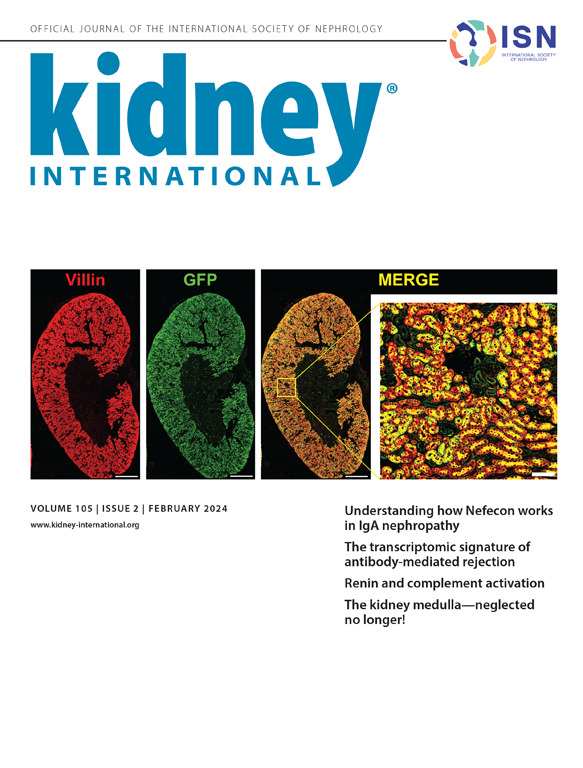SEN, slan和SEEDO关于肥胖相关肾脏疾病的共识报告。关于新分类的建议。
IF 12.6
1区 医学
Q1 UROLOGY & NEPHROLOGY
引用次数: 0
摘要
肥胖相关慢性肾脏疾病(Ob-CKD)是一种不同程度影响多种慢性肾脏疾病患者的改变:无超微结构病变(超滤过和/或蛋白尿),伴有肥胖相关性肾小球病变(肾小球肥大、足细胞病、基质系膜扩张、局灶性和节段性肾小球硬化、小管间质纤维化、血管病变和小管萎缩),与其他肾脏疾病相关,在透析计划的CKD患者以及移植肾脏患者中。S.E.N. (Sociedad Española de Nefrología)、SLANH (Sociedad Latinoamericana de Nefrología e Hipertensión)和SEEDO (Sociedad Española para el Estudio de la Obesidad)关于Ob-CKD的共识报告提出了一种基于肾脏改变和CKD分期(CKD、透析或肾移植)的分类,其明确目标是统一Ob-CKD的命名和随后的患者管理。该文件定义了Ob-CKD的分类。就目前Ob-CKD治疗的新策略而言,共识还认识到,如果可以的话,CKD患者肥胖的有效管理应该由多学科团队进行治疗,包括营养,体育活动,药物治疗以及必要时的减肥手术。此外,共识还提到了新的治疗方法,即以肠促胰岛素为基础的治疗方法,已被证明可以降低体重,对肥胖和CKD患者的心肾事件和心血管死亡有有益的影响。本文章由计算机程序翻译,如有差异,请以英文原文为准。
SEN, SLANH, and SEEDO Consensus report on Obesity related kidney disease. Proposal for a new classification.
Obesity-related Chronic Kidney Disease (Ob-CKD) is an alteration that affects a wide variety of patients with chronic kidney disease at different levels: without ultrastructural lesions (hyperfiltration and/or albuminuria), with obesity-related glomerulopathy (glomerular hypertrophy, podocytopathy, matrix mesangial expansion, focal and segmental glomerulosclerosis, tubular-interstitial fibrosis, vascular lesions and tubular atrophy), associated with other kidney diseases, in CKD persons in dialysis programs as well as patients with transplanted kidneys. The S.E.N. (Sociedad Española de Nefrología), SLANH (Sociedad Latinoamericana de Nefrología e Hipertensión), and SEEDO (Sociedad Española para el Estudio de la Obesidad) Consensus report on Ob-CKD proposes a classification based on kidney alterations and CKD stage (either CKD, dialysis, or kidney transplant) with the clear aim to unify nomenclature and subsequently the management of persons with Ob-CKD. The document defines a classification of Ob-CKD. As seen with current times in terms of new strategies for Ob-CKD treatment, the consensus also recognizes that an effective management of obesity in persons with CKD, when available, should be treated by a multidisciplinary team that incorporates nutrition, physical activity, pharmacotherapy as well as bariatric surgery if indicated. In addition, the consensus also mentioned the new therapeutic approach with incretin-based therapies that has demonstrated to decrease body weight and have a beneficial effect on cardiorenal events and reduction in cardiovascular death in patients with obesity and CKD.
求助全文
通过发布文献求助,成功后即可免费获取论文全文。
去求助
来源期刊

Kidney international
医学-泌尿学与肾脏学
CiteScore
23.30
自引率
3.10%
发文量
490
审稿时长
3-6 weeks
期刊介绍:
Kidney International (KI), the official journal of the International Society of Nephrology, is led by Dr. Pierre Ronco (Paris, France) and stands as one of nephrology's most cited and esteemed publications worldwide.
KI provides exceptional benefits for both readers and authors, featuring highly cited original articles, focused reviews, cutting-edge imaging techniques, and lively discussions on controversial topics.
The journal is dedicated to kidney research, serving researchers, clinical investigators, and practicing nephrologists.
 求助内容:
求助内容: 应助结果提醒方式:
应助结果提醒方式:


